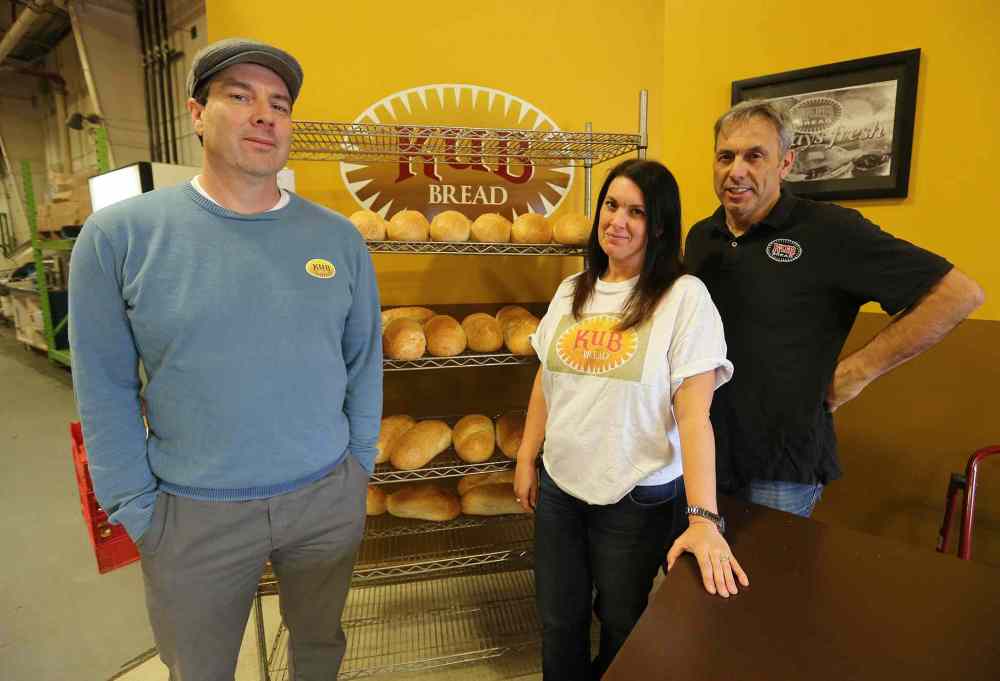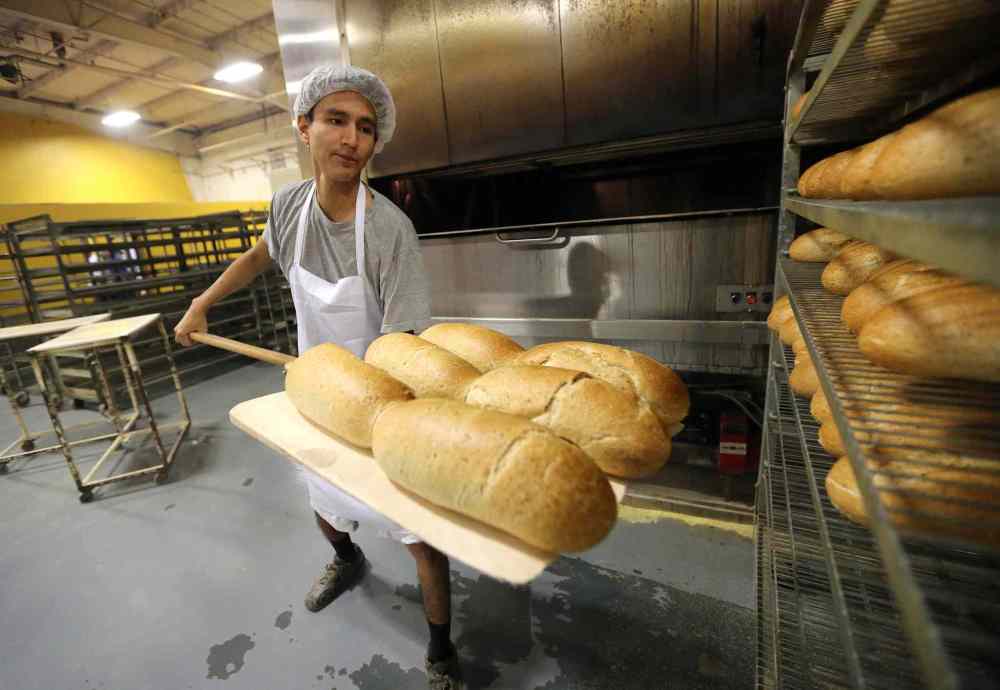Born and bread
Siblings took over iconic KUB Bakery from father
Advertisement
Read this article for free:
or
Already have an account? Log in here »
To continue reading, please subscribe:
Monthly Digital Subscription
$0 for the first 4 weeks*
- Enjoy unlimited reading on winnipegfreepress.com
- Read the E-Edition, our digital replica newspaper
- Access News Break, our award-winning app
- Play interactive puzzles
*No charge for 4 weeks then price increases to the regular rate of $19.00 plus GST every four weeks. Offer available to new and qualified returning subscribers only. Cancel any time.
Monthly Digital Subscription
$4.75/week*
- Enjoy unlimited reading on winnipegfreepress.com
- Read the E-Edition, our digital replica newspaper
- Access News Break, our award-winning app
- Play interactive puzzles
*Billed as $19 plus GST every four weeks. Cancel any time.
To continue reading, please subscribe:
Add Free Press access to your Brandon Sun subscription for only an additional
$1 for the first 4 weeks*
*Your next subscription payment will increase by $1.00 and you will be charged $16.99 plus GST for four weeks. After four weeks, your payment will increase to $23.99 plus GST every four weeks.
Read unlimited articles for free today:
or
Already have an account? Log in here »
Hey there, time traveller!
This article was published 06/11/2016 (3322 days ago), so information in it may no longer be current.

When Tara Fillion flew to Abbotsford, B.C., in September to visit her uncle, she brought along two pieces of luggage — one packed with clothes and cosmetics, the other with rye bread: KUB rye bread, to be precise.
“My uncle Hugh is originally from Carman, and he absolutely loves KUB (bread). He says it has a unique taste he just can’t get there,” Fillion says, explaining, in her uncle’s opinion, what is billed as rye bread in Western Canada is closer to multi-grain bread and is denser and heavier than what he was used to when he lived in Manitoba.
‘Our bread is still artisan. That’s how it started years ago, with a person putting the bread into the oven with a wooden paddle, and that’s how it’ll continue to be for however long we’re around’ — Kub co-owner Lisa Perkovic
“In the past, I have actually used Purolator to send KUB (bread) to him — once for his birthday and twice for Christmas,” she adds.
“We do hear those kinds of stories from time to time,” says Lisa Perkovic, one of three siblings at the helm of the KUB Bakery, which has two outlets, a main plant at 850 Erin St. and a retail-only operation at 1530 Regent Ave. W.
“People will tell us so-and-so moved away, and they’re shipping them a box of bread. It sounds crazy because there’s obviously express charges involved. It’s a perishable product, after all, so it’s not like you can just throw it in the general mail and hope it gets there in a week.”
“Customers also seem to get a kick out of telling us what they like to put on our bread,” interjects Perkovic’s brother Jeff Einfeld, who, along with their older brother, Ross Einfeld, rounds out the venerable bakery’s management team.
“Some people say they don’t like to rush it… that they’ll take a fresh loaf of bread home, get a jar of Cheez Whiz out of the fridge and leave everything on the table for 20 minutes or so before slathering (the Cheez Whiz) all over the bread.”
Ukrainian Bakery was founded in 1923 by a group of four North End businessmen, one of whom was Alex Kucher. Kucher bought his partners out a couple of years later, at which time the name of the establishment, which was situated in a converted house at 626 Stella Ave., was changed to Kucher’s Ukrainian Bakery, or KUB for short. (If you’re unsure whether KUB, which, over time, became the company’s official moniker, rhymes with tub or tube, take it from Kucher’s daughter, Olga, who, according to Russ Gourluck’s book The Mosaic Village: An Illustrated History of Winnipeg’s North End, pronounced it “cub.”)

In 1982, Jimmy Einfeld — the father of Perkovic and the Einfeld brothers — was employed as a bakery manager for a Winnipeg grocery chain. One afternoon, his flour supplier asked him if he was aware the KUB Bakery, another of his clients, was for sale. Not only was Einfeld not up on that bit of news, he admitted he wasn’t familiar with KUB, period.
He was suddenly interested, however, after the salesman began discussing how much flour he delivered there on a weekly basis.
“As soon as he started quoting these ridiculous numbers, my dad was like, ‘What are you talking about?’” says Perkovic.
Einfeld vividly recalls heading to the KUB Bakery a few days later with his curious father to have a look around and to test the merchandise. By then, Bill Kucher, Alex Kucher’s son, was running the show, Einfeld says, in a manner reminiscent of an famous character from the TV sitcom Seinfeld.
“People would walk in, and he’d be sitting near the cash register doing a crossword puzzle, wearing slippers and a trucker’s cap, resting high on his head,” he says.
“A customer would ask for five loaves of bread, and Bill would glance at the rack, then at the lineup that was generally out the door, and say, ‘You’re getting two.’ If people questioned him, he’d adopt this Soup Nazi tone and announce, ‘If you don’t like it, go to City Bread.’ He was quite the character.”
The elder Einfeld had already owned and operated a pair of bakeries, the Academy Bakery on Academy Road and the Highway Bakery on Henderson Highway, but with interest rates hovering at around 25 per cent in the early 1980s, he wasn’t sure he wanted to leave a secure, full-time job to start over again, says Jeff Einfeld.
“My dad was never one to talk about work at the supper table, but I distinctly remember him and my mom having these long, drawn-out conversations about whether he should or shouldn’t buy KUB,” Einfeld says. “But he believed in himself, he believed in the product, and he could see the potential. So he mortgaged our house on Lyndale Drive, took out a loan and went for it.”
One of the first things Einfeld’s father, who retired from the biz in 2001, did after assuming control was approach grocery store managers across the city to persuade them to stock their shelves with KUB bread. Before Einfeld took over, aside from a few small mom-and-pop outlets, KUB was only available at the Stella Avenue location, his son says.
“People used to do what they called the North End circuit. First, they’d go to the Perogie House on Dufferin (Avenue), then they’d hit us, then Gunn’s (Bakery) on Selkirk (Avenue) and finally Tenderloin Meat & Sausage on Main (Street). But after we got into Safeway in the late ’80s, we got really big really fast.”
In 2008, the KUB bakery was turning out nearly 100,000 loaves per week. Rye bread was still the company’s bread and butter, so to speak, but by then there were 11 other varieties to choose from, including French, garlic and raisin, as well as a mix of buns and pastry items. On April 12, 2008, Perkovic was puttering around in her backyard, which faces north, when she noticed plumes of black smoke in the distance. She didn’t think much of it until her phone started ringing off the hook around 2 p.m.
“When I finally picked up, it was one of the employees at our Regent Avenue location. She told me, ‘People are calling, saying our (Stella Avenue) bakery is on fire, and I’m wondering what to say.’ I was like, ‘What? That’s impossible.’”
Perkovic immediately got in touch with her brothers, both of whom had been fielding similar calls. The three of them drove to Stella Avenue together, where it was confirmed their flagship location was indeed burning to the ground.
“The fire was kind of a watershed moment for us,” says Jeff Einfeld, adding the cause of the fire was attributed to a faulty roof. “We were a little under-insured coming out of it, so in order to pay off our creditors, we had to take (money) out of future growth, out of the business… out of our own paycheques.
“It’s taken a long time — almost nine years — and we’re still trying, essentially, to get out of that hole.”
(The bakery moved into its current, 11,500-square-foot digs on Erin Street in 2011 after a prolonged, three-year-struggle to find a building that suited the owners’ needs.)

If you give Perkovic five minutes, she can probably find the original, typewritten recipe for KUB rye bread, which Bill Kucher presented to her dad 34 years ago. Each individual loaf of bread is hand-formed the same way it was in the 1920s, she says, using flour brought in from Prairie Flour Mills in Elie.
“Most of our competitors are mechanized. Almost every one of their loaves is identical to the next, while our bread is still artisan. That’s how it started years ago, with a person putting the bread into the oven with a wooden paddle, and that’s how it’ll continue to be for however long we’re around,” she vows.
By the way, if you’re standing in line at the grocery store, waiting to pay for your items and you suddenly sense a warm glow enveloping you, that’s probably just the married mother of two eyeing what’s in your cart.
“For sure, I always sneak a glance at their baskets, to see if they have our bread in there,” Perkovic says with a twinkle in her eye.
“And if they do, I tell them I love them. Not out loud, of course — that would be rather strange —but definitely in my head.”
David Sanderson writes about Winnipeg-centric businesses and restaurants.
david.sanderson@freepress.mb.ca
Dave Sanderson was born in Regina but please, don’t hold that against him.
Our newsroom depends on a growing audience of readers to power our journalism. If you are not a paid reader, please consider becoming a subscriber.
Our newsroom depends on its audience of readers to power our journalism. Thank you for your support.


